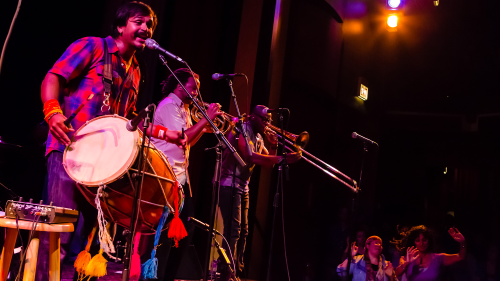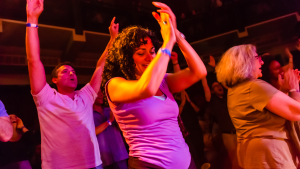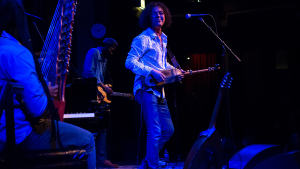How Old Town School of Folk Music brings the sounds of the world to Chicago

If, as Henry Wadsworth Longfellow wrote, "music is the universal language of mankind," then the Old Town School of Folk Music is a great place to become fluent.
The school is one of just a few in the Midwest offering both classes and concerts featuring music from around the world, and they take their mission seriously.
“We think that folk music of any tradition is important to keep alive and a vital part of communities,” Jim Newcomb, Old Town School of Folk Music’s CEO and executive director, told ChicagoGlobal. “It helps not just people in that community understand and connect to their heritage more, but also people from other traditions to understand other people’s heritage in new and interesting ways.”
Old Town School of Folk Music was founded in 1957 amid a growing national interest in American folk music. But the musical traditions of other countries and cultures quickly became part of the school’s ethos, and Newcomb says that global focus has become even stronger over the last two decades. Today, the school offers more than 400 courses in music, dance, and visual art, and many of them — Irish fiddle, Latin guitar, African drums — feature international themes.
Renewed digital effort in the works
During the pandemic, when the school conducted its classes virtually, it saw a surprising uptick in international students signing up for classes.
“We started having people signing up from all over the world,” said Newcomb. “In one case, there were a bunch of people from small communities in Ireland who signed up to take Irish music classes from the Old Town School because they didn't have music teachers in their town that they could take lessons from. It was just a mind blower to me.”
Today, around 5% of the Old Town School’s class load is online, a “retrenchment” from the pandemic era, according to Newcomb. Still, he told ChicagoGlobal he expects to expand the number of online classes on offer soon, following a concerted effort to regroup and consider how best to “allow our international audiences to come in and teach stuff and learn stuff from Old Town.”
When it comes time to relaunch a fuller digital course catalog, it will be “a more complete suite,” Newcomb said.
In deciding what classes to offer, he added, the school tries to “respond to demand more than necessarily generate it” — a guideline that applies to both online and in-person courses. For example, the school has taught many classes in Middle Eastern music because it serves a robust local Middle Eastern community.
Benefits for artists, not just audiences
Old Town School not only teaches classes, but also puts on concerts and festivals, including on World Music Wednesdays. Presently, the school hosts 40 World Music Wednesday concerts per year, of which three-fourths are performed by artists visiting from overseas. Unlike much of the rest of Old Town School’s programming, these concerts are free to the public (though the school recommends a donation).
"I think people's musical choices tend to be pretty parochial, and we want people to come and experience other cultures."
Sylvia Lopez, Old Town School’s director of community projects and events, added that ensuring World Music Wednesdays are free is “so important” because it allows individuals who cannot normally afford concert tickets to “enrich their life with this music.”
When she is looking to book artists for concerts, Lopez described asking herself the question: “What do we normally not have access to?”
That strategy has led her to develop relationships with bands like Qwanqwa, a psychedelic folk group from Ethiopia that has performed in both World Music Wednesdays and in an Old Town School partnership that brings world musicians into South Side schools. Lopez describes that program as a key way to “expose those students to this type of music, because it’s very hard to come by.”
“As far as the audience is concerned, they love the variety of being able to see things they would normally not see,” Lopez continued.
It is a win for musical artists as well, who receive a platform by which to promote their music.

Images courtesy of Old Town School of Folk Music

But organizing year-long schedules with international artists can create challenges for Lopez. Musicians from overseas have to arrange their visas and tour schedules in advance, which, for Lopez, means keeping in touch with thousands of artists every year.
“Building those connections with those types of artists is really an important factor,” she said, because it allows a relationship to form even if the artist has not yet finalized their visa status or tour schedule for the U.S. market.
'Getting people to come out and party'
That rapport is especially crucial when it comes time for the major festivals that Old Town School of Folk Music puts on throughout the year. This year, one of the largest is Global Carnival, an off-season celebration of Lenten Carnival culture scheduled for Sept. 22 in Millennium Park.
“Millennium Park is in some ways just another gig, it’s just got a much larger audience,” said Newcomb. “It puts a little more pressure on the team to make sure everybody’s got their visas and everything together.”
He is optimistic not only that the production will be a success, but that audiences are going to enthusiastically show out. Performers will be coming in from Brazil and New Orleans, and Newcomb anticipates that attendees, too, will travel from far afield to attend.
“We think people are going to go nuts when they hear about it,” he said. “I don’t think we’re going to have any problem getting people to come out and party.”
This story first appeared in the ChicagoGlobal newsletter, a joint project of Crain's Chicago Business and the Chicago Council on Global Affairs.

